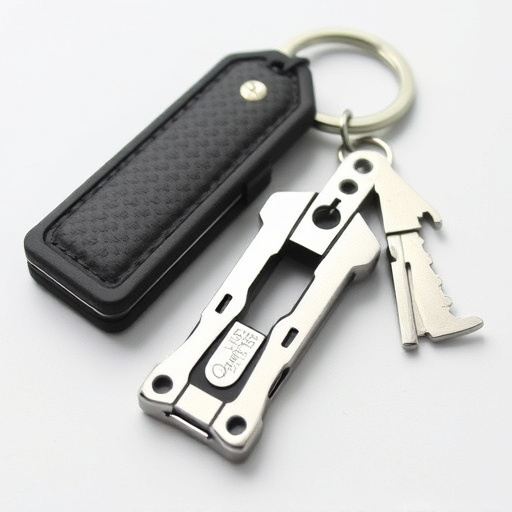Kubotan keychain escape techniques, while popular for self-defense, navigate a complex legal landscape in the US due to state-by-state variations in regulations. Understanding local laws is critical to legal carrying and use, as restrictions on age, registration, storage, and targeted pressure points vary widely. These regulations stem from differing interpretations of self-defense and force laws aimed at ensuring public safety; thus, staying informed is crucial for responsible Kubotan use.
“Uncover the legal landscape of self-defense keychains, specifically focusing on the Kubotan keychain, in a diverse range of states. This comprehensive guide explores the intricate balance between personal safety and legal boundaries.
From understanding the legal definition and permissible use cases to delving into state-specific regulations, we navigate the variations that matter. Additionally, discover essential safety considerations and training techniques for effective self-defense using Kubotan keychain escape skills.”
- Understanding Kubotan Keychain Laws: A Comprehensive Overview
- Legal Definition and Use Cases: When is it Permissible?
- State-Specific Regulations: Unraveling the Variations
- Safety and Training Considerations for Effective Defense
Understanding Kubotan Keychain Laws: A Comprehensive Overview
Understanding Kubotan Keychain Laws involves navigating a complex web of state-specific regulations. Each U.S. state has its own set of rules governing the use and possession of self-defense tools, including Kubotans—keychains designed for escape techniques in emergency situations. These tiny but powerful devices can be a legal gray area without proper knowledge.
Many states allow citizens to carry self-defense tools like Kubotans if they meet specific criteria, such as age restrictions and registration requirements. Some even classify them as legal under the “stand your ground” doctrine, enabling individuals to use force for self-protection. However, illegal use or possession can lead to severe consequences, including fines and imprisonment. Staying informed about local laws is essential to ensure you’re using a Kubotan keychain responsibly and legally.
Legal Definition and Use Cases: When is it Permissible?
The legal definition of a self-defense keychain, often referred to as a Kubotan, varies by state. Generally, it is considered a tool designed for personal protection and may be used in specific circumstances to deter or escape from an attack. These keychains are typically small, portable devices equipped with a sharp point or edge, which can be employed for self-defense when facing dangerous situations.
Use cases for Kubotan keychain escape techniques include instances where an individual feels threatened or is caught in an unexpected attack. It may be permissible to use the keychain as a last resort to fend off an assailant and create an opportunity to escape. However, the legality of its usage depends on state laws regarding self-defense and the level of force one can employ. Each state has different regulations, so understanding local laws is crucial before considering carrying or using such a device for personal safety.
State-Specific Regulations: Unraveling the Variations
In the United States, the legal landscape surrounding self-defense keychain tools like the Kubotan varies significantly from state to state. What may be permitted in one state could be tightly regulated or even illegal in another. These variations stem from different interpretations of existing laws and new legislation introduced to address public safety concerns. For instance, some states explicitly allow self-defense keychains if they meet certain criteria, such as a limited number of defense mechanisms and a requirement to use them only in response to an imminent threat.
States with stricter regulations often have specific restrictions on the type of pressure points a Kubotan or similar device can target, aiming to prevent injury or death under non-life-threatening circumstances. Other legal requirements may include age restrictions for carrying such tools, registration or permit mandates, and even rules around where they can be stored in a vehicle or carried on one’s person. Understanding these state-specific regulations is crucial for individuals looking to legally protect themselves using kubotan keychain escape techniques.
Safety and Training Considerations for Effective Defense
Staying safe is paramount, and having a self-defense keychain like a Kubotan can be a powerful tool. However, effectiveness hinges on proper training and understanding of escape techniques. Many keychains are designed to cause pain or disorient an attacker, allowing you to create space and escape.
Training should cover not just how to use the keychain but also situational awareness, de-escalation strategies, and basic self-defense moves. Practicing these skills in controlled environments can ensure you react instinctively and effectively when faced with a real threat. Remember, knowledge is key; understanding Kubotan keychain escape techniques could be the difference between safety and danger.
Understanding the legal framework surrounding kubotan keychain self-defense is crucial for individuals seeking to protect themselves. This article has provided a comprehensive overview of kubotan laws, highlighting state-specific regulations and their impact on carry permissions. By exploring real-world use cases and safety considerations, readers are equipped with knowledge to navigate self-defense options effectively. Remember, staying informed about your rights and responsibilities is key when considering Kubotan keychain escape techniques for personal safety.
